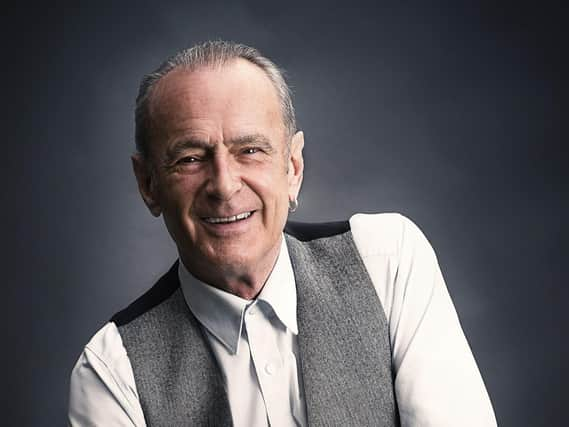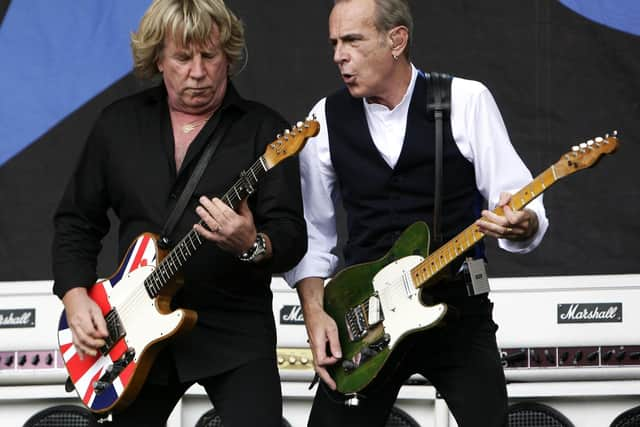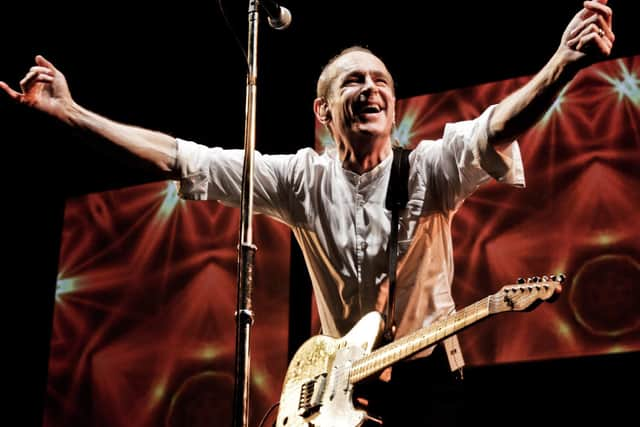Status Quo frontman Francis Rossi on music snobbery, Rick Parfitt and why he likes Harrogate


These days Abba fans aren’t shy in coming forward, but back in their heyday music aficionados were perhaps a little more snooty. Status Quo singer-songwriter Francis Rossi certainly thinks this was the case.
“It was an image thing. I remember not being able to like Abba. I was told it wasn’t cool, but it certainly is now,” he says. “They were special and they were all along. It’s just they were a soppy-looking outfit that sang with a strange accent and they won Eurovision – all the things you shouldn’t do.”
Advertisement
Hide AdAdvertisement
Hide AdRossi says music was too compartmentalised back then. “You can’t imagine Deep Purple doing Octopus’s Garden, or Pink Floyd doing Yellow Submarine… but you get up your own derriere if you’re not careful,” he says. “But I think that will turn and the young ones today won’t do that any more.”


The 72-year-old musician has plenty to talk about from a career spanning more than 50 years, during which time Status Quo has produced 33 studio albums, sold more than 118 million records and enjoyed a string of hit singles including Rockin’ All Over the World, Down Down and In the Army Now.
And Rossi will be discussing all this in his “in conversation” show, I Talk Too Much, which has resumed its nationwide tour and takes in Bradford, Scarborough and Northallerton.
Rossi says he’s looking forward to returning to Yorkshire, and one place in particular. “I’ve often thought I’d like to live up in Harrogate. Whenever we were up there playing, I used to love going there on days off and I’m hoping to go back. I was brought up a Tory and there’s something about that traditional, conservative vibe that I love.”
Advertisement
Hide AdAdvertisement
Hide AdThis prompts a rant about the state of politics in this country and why the extremes both on the left and the right are as bad as each other. “I’m a Tory but I don’t want to s*** on the other fellow,” he adds. It’s not a political slogan that’s likely to catch on, but then Rossi has no interest in being a politician. “I’m a bit like Russell Brand. I’ve got these opinions and such like but I do talk too much. I never used to when I was younger and as I’ve got older I find I do.”


Rossi was born and raised in London and music was in the house as far back as he can remember. “My parents had lots of records. We had Italian opera and lots of pop music, and my mother loved Tchaikovsky,” he says.
“I was going to play the accordion when I was five or six and I was given a harmonica, but then I saw the Everly Brothers when I was about eight or nine and ‘I thought I want to do that’.”
At secondary school he played the trumpet in the orchestra and later met Alan Lancaster and Alan Key and together they set up a band, the Spectres, in 1963. They joined the burgeoning club circuit doing a mixture of Chuck Berry and Little Richard covers and their own songs.
Advertisement
Hide AdAdvertisement
Hide AdFour years later Rossi and Lancaster had changed the band’s name to Status Quo and it was while performing shows at Butlins that they met guitarist Rick Parfitt. “We met Rick, he was in a cabaret act, and he joined us just before ’68.”
The Quo’s first hit, Pictures of Matchstick Men, was heavily influenced by the psychedelic sound of the late Sixties. “I was copying what was around at the time,” says Rossi. Despite their initial success, he admits it was hard trying to make a name for themselves. “It was a slog. We just got there in ’68 and then everything was changing, but it was galvanising. It was us against the world and many bands from that era will tell you the same thing.”
This meant playing gigs in crummy pubs and clubs. “There was this huge circuit around England and you’d play in front of 40 or 50 people and the next time you went back it was 110 and then 200, and you were getting better as players and playing tighter together,” he says.
The band’s 1972 album Piledriver, which included the single Paper Plane, helped propel them into the big time. “I’ve always maintained that Status Quo are a pop, rock, country and blues band. We’ve made such fabulous moves here and there and some howling mistakes at other times. But you never know which is a howler and which is a goody until you’re out there doing it,” he says.
Advertisement
Hide AdAdvertisement
Hide AdThe band has also had to fend off critics over the years. “People would say you do the same record over again and I’d say ‘well, at least unlike Chuck Berry we change the melody sometimes’,” says Rossi. “I don’t believe Status Quo are as great as some people think they are, but I definitely don’t think they’re as bad as some other people think they are. Guess what? We’re somewhere in the middle of those estimations.”
The band, though, can claim a bit of pop music history for they kicked off the 1985 Live Aid concert in front of a packed crowd at Wembley, and a huge global TV audience. “It was totally unique,” recalls Rossi.
“Normally when you walk on, people have paid money and they’re expecting something, whereas this crowd was just so pleased to be there and be part of this thing that was about other people, and I’ve never felt that about an audience before or since. I was there all day, but Rick went back to Battersea where he was living at the time.
"I was there with my daughter’s mother and we were backstage, I don’t remember too much. I saw David Bowie a couple of times and then I saw him late in the evening and I said ‘how do you do that?’ because he looked so dapper and immaculate and he just went, ‘ah ha’.”
Advertisement
Hide AdAdvertisement
Hide AdFor years Rossi and Parfitt were at the heart of Status Quo, though their partnership wasn’t always a smooth one. “It was very much up and down. When we were younger we were inseparable. We were very funny together on television sometimes, and we looked very good together on stage sometimes. But we grew up, we got married, we had children and life changes you…” says Rossi.
They continued performing together until Parfitt’s death in 2016. “After his heart attack a lot of the angst was gone and he seemed content. I’d be pretending if I said I cried when he died, and perhaps people want me to pretend. It doesn’t mean I don’t miss him. But I don’t pine away and neither would he have done. We’re in showbusiness, you’ve got to get up and carry on.”
And for Rossi it’s all about the next gig, no matter how big or small. “It’s like that story they told us when we were kids about a donkey with a stick on its head and some string in front of him with a carrot to make him keep walking… and I’m still chasing the carrot.”
Francis Rossi, I Talk Too Much, at St George’s Hall, Bradford, July 29; the Spa Theatre, Scarborough, Aug 1; and The Forum, Northallerton, Aug 26.